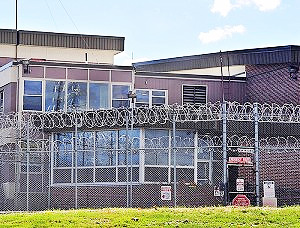Maine Gov. Paul LePage said Friday that he’s adding a “significant” number of substance abuse treatment beds at the Maine Correctional Center in Windham – a statement that baffled and upset some Democratic lawmakers.
LePage, a Republican, also promised to continue to address the opioid crisis “on all fronts,” after the Maine Attorney General’s Office reported Thursday that 418 people died from overdoses in 2017 – an 11 percent increase over the 376 overdose deaths in 2016 and a continuation of the sharp climb in overdose deaths in the past five years.
“We are saddened to see an increase in overdose deaths due to opioids and we will continue to address this crisis on all fronts,” LePage said in a written statement. “We need more education, stronger enforcement and more available treatment, including faith-based programs.”
LePage also said, “We are adding hundreds of treatment beds in Windham with a significant portion dedicated to substance-abuse intervention.” The governor has blamed Democrats for blocking his efforts to expand drug treatment at the prison in the past.
In 2016, the Legislature approved a $150 million bond issue for a planned renovation and expansion of the state prison in Windham. At the time, the Maine Department of Corrections indicated that the project would expand inmate treatment for substance abuse, among other physical, behavioral and mental health issues.
However, Democratic lawmakers said Friday they’ve seen no plan for the prison expansion that includes a detailed proposal to increase access to substance abuse treatment. The department’s website shows only a feasibility study and concept proposal for the project dating back to 2014, when the cost estimate for the expansion was $173 million.
“I don’t know what he’s talking about,” said Rep. Charlotte Warren, D-Hallowell, House chairwoman of the Criminal Justice and Public Safety Committee.
“There has been conversation about treatment beds, but he’s talking about incarcerating folks,” Warren said. “We’re talking about a public health crisis and again our chief executive turns to the criminal justice system. He’s pivoting away from the problem and he’s looking for someone to blame it on.”
Senate Democratic Leader Troy Jackson, D-Allagash, further questioned why such a significant part of the governor’s purported drug treatment strategy is linked to incarceration.
“We don’t need to wait for people to break a law before we start treating them,” Jackson said. “That shouldn’t be a priority. Let’s start treating people right now.”
In his statement, the governor also highlighted the need to stop fentanyl from coming into Maine.
“The increasing availability of fentanyl is fueling an increase in overdoses,” LePage said. “Fentanyl-related deaths surged 27 percent in 2017. When heroin users are led to believe they are taking their usual amount of heroin, but it is fentanyl, they overdose. We must stop the trafficking of fentanyl into our state.”
LePage noted that the Maine Bureau of Insurance released data last month showing a 21 percent decrease in prescriptions for opiates or opioid derivatives among people covered by insurance, from 51,253 in the first half of 2016 to 40,591 in the first half of 2017.
“We must also focus prevention efforts on our middle-school youth so that they never start using any addictive substance that can lead them down this tragic path,” LePage said.
LePage closed his statement by taking Attorney General Janet Mills to task for issuing Thursday’s overdose data with a newspaper opinion piece she wrote about the opioid crisis that didn’t say she’s a Democratic candidate for governor.

Democratic lawmakers said Friday they’ve seen no plan for the prison expansion that includes a detailed proposal to increase access to substance abuse treatment (Portland Press Herald file photo)
Comments are no longer available on this story